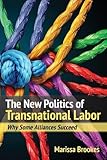The New Politics of Transnational Labor : Why Some Alliances Succeed / Marissa Brookes.
Material type: TextPublisher: Ithaca, NY : Cornell University Press, [2019]Copyright date: ©2018Description: 1 online resource (216 p.) : 1 chartContent type:
TextPublisher: Ithaca, NY : Cornell University Press, [2019]Copyright date: ©2018Description: 1 online resource (216 p.) : 1 chartContent type: - 9781501733208
- International labor activities
- Labor and globalization
- Labor movement -- International cooperation
- Labor unions -- Political activity
- Transnationalism
- International Studies
- Labor History
- Sociology & Social Science
- POLITICAL SCIENCE / Labor & Industrial Relations
- transnational alliances, economic globalization, transnational activism, borders, workers
- 331.88091 23
- online - DeGruyter
| Item type | Current library | Call number | URL | Status | Notes | Barcode | |
|---|---|---|---|---|---|---|---|
 eBook
eBook
|
Biblioteca "Angelicum" Pont. Univ. S.Tommaso d'Aquino Nuvola online | online - DeGruyter (Browse shelf(Opens below)) | Online access | Not for loan (Accesso limitato) | Accesso per gli utenti autorizzati / Access for authorized users | (dgr)9781501733208 |
Browsing Biblioteca "Angelicum" Pont. Univ. S.Tommaso d'Aquino shelves, Shelving location: Nuvola online Close shelf browser (Hides shelf browser)

|

|

|

|

|

|

|
||
| online - DeGruyter Divine Nature and Human Language : Essays in Philosophical Theology / | online - DeGruyter Administrative Law in a Global Era / | online - DeGruyter Public Politics in an Authoritarian State : Making Foreign Policy during the Brezhnev Years / | online - DeGruyter The New Politics of Transnational Labor : Why Some Alliances Succeed / | online - DeGruyter Music and Musicians in Ancient Greece / | online - DeGruyter Nietzsche contra Democracy / | online - DeGruyter Descartes and the Last Scholastics / |
Frontmatter -- Contents -- Acknowledgments -- List of Abbreviations -- 1. The New Politics of Transnational Labor -- 2. Dockers, Wharfies, Longshoremen Unite: Coordinating the Liverpool and Patrick Campaigns -- 3. Service-Sector Solidarity: Coordinating the Tesco and G4S Campaigns -- 4. Struggle in Paradise: Context-Appropriate Power in the Shangri-La and Raffles Campaigns -- Conclusion: Labor’s Unwritten Future -- Notes -- References -- Index
restricted access online access with authorization star
http://purl.org/coar/access_right/c_16ec
Over the years many transnational labor alliances have succeeded in improving conditions for workers, but many more have not. In The New Politics of Transnational Labor, Marissa Brookes explains why this dichotomy has occurred. Using the coordination and context-appropriate (CCAP) theory, she assesses this divergence, arguing that the success of transnational alliances hinges not only on effective coordination across borders and within workers' local organizations but also on their ability to exploit vulnerabilities in global value chains, invoke national and international institutions, and mobilize networks of stakeholders in ways that threaten employers' core, material interests.Brookes uses six comparative case studies spanning four industries, five countries, and fifteen years. From dockside labor disputes in Britain and Australia to service sector campaigns in the supermarket and private security industries to campaigns aimed at luxury hotels in Southeast Asia, Brookes creates her new theoretical framework and speaks to debates in international and comparative political economy on the politics of economic globalization, the viability of private governance, and the impact of organized labor on economic inequality. From this assessment, Brookes provides a vital update to the international relations literature on non-state actors and transnational activism and shows how we can understand the unique capacities labor has as a transnational actor.
Mode of access: Internet via World Wide Web.
In English.
Description based on online resource; title from PDF title page (publisher's Web site, viewed 26. Apr 2024)


